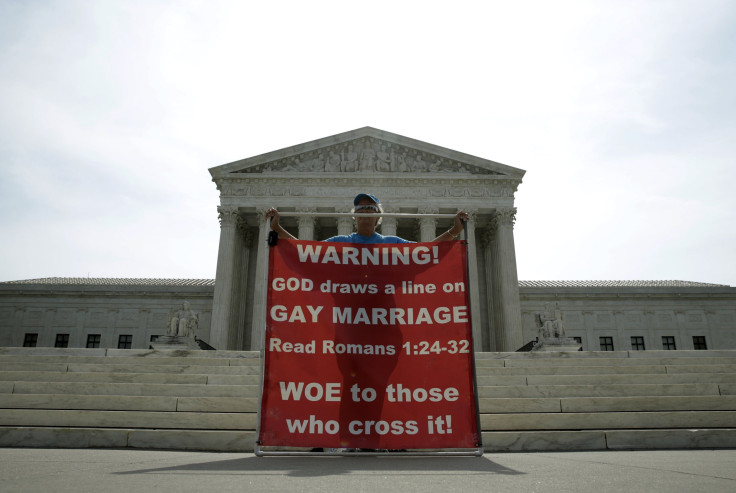Will Supreme Court Gay Marriage Ruling End Culture Wars? Activists On Both Sides Say No

The Supreme Court decision handed down Friday that mandates legal same-sex marriage across the U.S. doesn’t change transgender activist Mariah Lopez’s mission to end unchecked discrimination and violence against her community. It also won't stop conservative family values activist John Eastman from fighting for religious freedoms.
The Supreme Court's historic ruling was an important marker in the decades-long battle over marriage equality, but activists on both sides say they will continue to push their agendas and lobby for laws that reflect their values, signaling the nation's divisive culture wars are far from over. For the lesbian, gay, bisexual and transgender community, it’s about protecting married and unmarried individuals from workplace discrimination, hate crimes and exclusion in their communities. For religious conservatives, it’s about ensuring Christian business owners and clergy that state and federal laws won’t require them to support LGBT lifestyles, whether that means performing marriages or taking photos at weddings.
Lopez, who runs the Strategic Trans Alliance for Radical Reform in New York City, said the gay community’s leadership still has a lot of work to do to improve the lives of American LGBT people, particularly those in communities of color, where marriage isn’t a top civil rights priority. “Currently, no concrete or viable strategies exist for addressing these issues systematically within black, Latino and poor communities nationwide,” she said, adding that some of the work will fall to leaders like herself.
Lopez, a transgender woman who is of black and Latino heritage, said she frequently receives emergency calls from other young trans women suffering from homelessness, underemployment and a lack of access to adequate healthcare that supports those who are transitioning to their desired gender.
Eastman said Christian business owners are continually targeted because of their belief that marriage should be a union between one man and one woman. In April, a pizza shop in Indiana that said it would refuse service to LGBT weddings and functions on the basis of that belief faced significant backlash on social media websites.
“It’d be foolish to think that we’re not going to have even more radical consequences, like the consequence that we are seeing now,” said Eastman, chairman of the board of the National Organization for Marriage, which opposes same-sex unions. “When we’ve weakened the American family by redefining marriage, we’ve seen catastrophic impacts on religious freedom.”
Gay Marriage Battle Heads To State Legislatures
Same-sex marriages was previously legal in 37 states. In April, the Supreme Court considered challenges to bans on marriage and recognition of marriages in Tennessee, Ohio, Kentucky and Michigan. The case, Obergefell v. Hodges, asked the justices to decide if states could outright deny gay couples the right to marry and or if states should recognize marriages that were performed legally elsewhere. The 5-4 ruling Friday made gay marriage the law of the land.
Conservatives say the decision jeopardizes religious freedoms. "The Supreme Court is not an embodiement of the will of American people," said Richard Land, president of the Southern Evangelical Seminary, a Christian college that opposes same-sex marriage. "The Supreme Court can give us nine lawyers’ opinion about what’s legal and illegal. That should never be confused with what’s right and what’s wrong."
In recent years, conservative and LGBT activists have battled in state Legislatures across the country over gay marriage rights. Republican-led bodies passed laws that they claimed would protect businesses and pastors who feared they couldn’t legally refuse to support or officiate ceremonies for LGBT couples. Texas Gov. Greg Abbott signed this month bipartisan legislation allowing clergy members to opt out of performing marriages that offend their religious beliefs. Earlier this year, Indiana, Georgia and Arkansas passed, amended or tabled so-called religious freedom restoration laws that critics said were targeted against LGBT people.
Friday's Supreme Court's ruling will likely trigger new anti-LGBT state laws, gay activists said. “It’s really dangerous to think that it’s the end of the LGBT movement,” said Sarah Kate Ellis, the president of Gay & Lesbian Alliance Against Defamation, a group pushing for increased LGBT representation in the media, of the ruling. “It’s just one victory -- it does not mean we are living our fully realized lives."
Eastman, the chairman of National Organization for Marriage, said he had little doubt that conservatives would respond strategically to a decision that legalizes marriage for all. “There will be constitutional amendments, civil disobedience and other legislation that limits the breadth of the decision’s impact," he said. "This will happen in states that quite rightly view that the Supreme Court has no place counteracting their marriage policy.”
Ahead of the court's ruling, GLAAD representatives embarked on a visibility campaign in ultra-conservative Southern U.S. states, to promote inclusion and acceptance of the LGBT people living in those communities. One out of three Americans, or nearly 120 million people, say they are uncomfortable with living around gays or having an LBGT family member, according to a Harris Poll survey of Americans released in February. A third of non-LGBT Americans get uncomfortable seeing a same-sex couple holding hands. A third of them also said they would be uncomfortable attending a same-sex wedding.
A Supreme Court ruling legalizing same-sex marriage nationwide doesn’t change those attitudes overnight, Ellis said. “We’re just talking about marriage here; we’re not talking about employment, housing and hate crimes,” Ellis said.
Evan Wilson, president of the pro-marriage equality group, Freedom to Marry, said the LGBT community is looking for more than equal marriage laws. "We want good lives," he said. "But we need to have the same robust campaign to eliminate discrimination in housing, education, and employment, as we had to win the freedom to marry. We also need to be passing more state and local nondiscrimination laws, both because they provide protections themselves and because they are the building blocks to get the country where it needs to be."
© Copyright IBTimes 2025. All rights reserved.






















